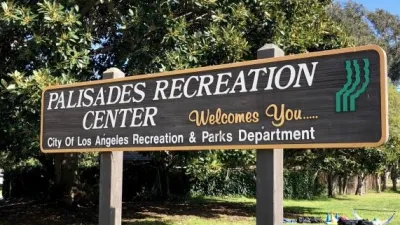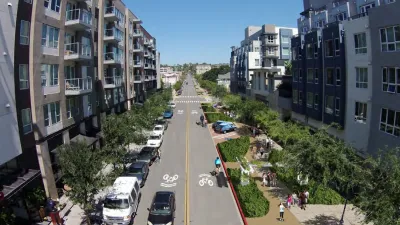Although it’s already been dealt one parliamentary setback, the “Anti-Social Behaviour, Crime and Policing Bill” is still under consideration in the U.K. Critics are concerned that, if the law passes, there will be no true public space left.
Although the idea of banning certain people or activities from public space is common practice in the United States, the United Kingdom has thus far managed to avoid such draconian measures for the regulation of its publicly owned spaces. Parliament, however, is currently considering a law that “greatly expands powers for state authorities to control who can do what in public space,” writes Josie Appleton.
The law experienced a setback earlier this month, when the Lords rejected parts of the law, but opposition groups are still concerned that the remainder of the bill might pass. Appleton voices their concerns: “When the Anti-Social Behaviour, Crime and Policing Bill becomes law in a few weeks, we can say that there is no longer such a thing as public space proper in Britain.”
Appleton details some of the powers made possible by the new law:
—“‘Injunctions for the Prevention of Nuisance and Annoyance’ under which anybody whose activity could cause ‘nuisance and annoyance’ to ‘any other person’ can be issued with an injunction prohibiting them from this activity or imposing positive conditions upon them. This ‘annoyance’ definition is so broad that it could catch most things people do in public space – after all, busking, preaching, protesting, wearing certain clothes, singing etc, all annoy somebody.”
—“‘Public Space Protection Orders’ (PSPOs) will mean that local authorities can ban activities which they believe have a ‘detrimental effect’ on the ‘quality of life’ of the area. Again, this could catch almost anything…Worse, it is a summary power meaning the authority doesn’t have to consult the public and can be targeted at particular groups.”
FULL STORY: The End of Public Space: One Law to Ban Them All

Alabama: Trump Terminates Settlements for Black Communities Harmed By Raw Sewage
Trump deemed the landmark civil rights agreement “illegal DEI and environmental justice policy.”

Planetizen Federal Action Tracker
A weekly monitor of how Trump’s orders and actions are impacting planners and planning in America.

Why Should We Subsidize Public Transportation?
Many public transit agencies face financial stress due to rising costs, declining fare revenue, and declining subsidies. Transit advocates must provide a strong business case for increasing public transit funding.

Understanding Road Diets
An explainer from Momentum highlights the advantages of reducing vehicle lanes in favor of more bike, transit, and pedestrian infrastructure.

New California Law Regulates Warehouse Pollution
A new law tightens building and emissions regulations for large distribution warehouses to mitigate air pollution and traffic in surrounding communities.

Phoenix Announces Opening Date for Light Rail Extension
The South Central extension will connect South Phoenix to downtown and other major hubs starting on June 7.
Urban Design for Planners 1: Software Tools
This six-course series explores essential urban design concepts using open source software and equips planners with the tools they need to participate fully in the urban design process.
Planning for Universal Design
Learn the tools for implementing Universal Design in planning regulations.
Caltrans
Smith Gee Studio
Institute for Housing and Urban Development Studies (IHS)
City of Grandview
Harvard GSD Executive Education
Toledo-Lucas County Plan Commissions
Salt Lake City
NYU Wagner Graduate School of Public Service





























